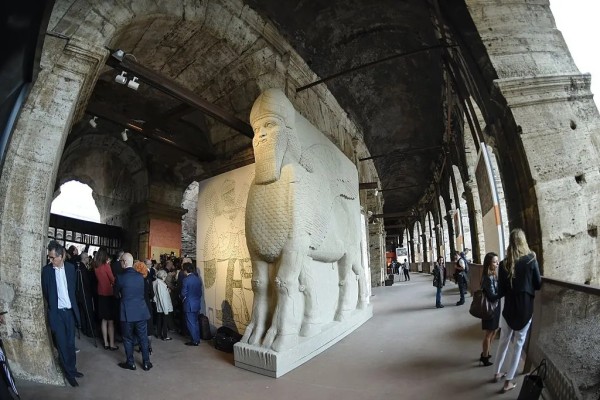
People walk past a reconstitution of the human-headed bull from the North-West Palace in Nimrod, as part of an exhibition called "Rising from Destruction Ebla, Nimrod, Palmyra" presented at the ancient Colosseum, October 6, 2016, in Rome. AFP / ANDREAS SOLARO (PHOTO CREDIT SHOULD READ ANDREAS SOLARO/AFP VIA GETTY IMAGES)
Ishtartv.com – artnews.com
BY DANIEL CASSADY, February 9, 2024
Iraq has received a replica of the famous Assyrian “Bull of Nimrud”
statue that stood in the Roman Colosseum and at the UNESCO headquarters in
Paris, according to the Art Newspaper. A gift from the Italian government, the
statue now permanently resides outside the Basrah Museum.
The original monument, destroyed by ISIS militants in 2015, was made in
the 9th century BC and stood over 16 feet. The replica was constructed with 3D
printing technology.
“Italy is at the forefront of safeguarding cultural heritage because it
is the soul of a nation and embodies its history,” Gennaro Sangiuliano, Italy’s
culture minister, read from a statement at an inauguration ceremony at the
museum attended by Italian and Iraqi officials this past Tuesday. “It will
therefore continue to make every effort to advance international collaboration
in the field of cultural heritage protection and to work for the enhancement of
the heritage of humanity.”
The historical city of Nimrud, located near modern-day Mosul, was chosen
as the capital by the Assyrian king Ashurnasirpal II (883–859 BCE).
Ashurbanipal II built a grand palace decorated with multiple “lamassu”
monuments: statues of lions or winged bulls, each with the head of a bearded
man. The “Bull of Nimrud” is among the many cultural artifacts that ISIS
destroyed when they attacked the archaeological site in 2015.
The replica was made by a team of experts led by restoration specialist
Nicola Salvioli, who crafted a model of the creature out of polystyrene from
images and video footage. Later, that model was used as the basis for a larger
fiberglass copy that was fabricated by 3D printer. Once the process was
completed, the monument was covered in a mixture of plastic and stone dust to
give the appearance of authenticity.
The gift comes on the heels of a high-profile restitution in June of
last year from Italy to Iraq of a tablet engraved with cuneiform text and the
insignia of the Assyrian king Shalmaneser III. According to prior reports, “the
circumstances surrounding the tablet’s arrival in Italy remain unclear.”
|